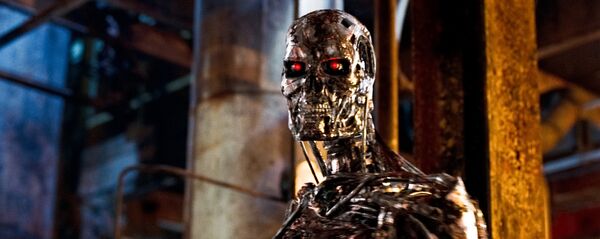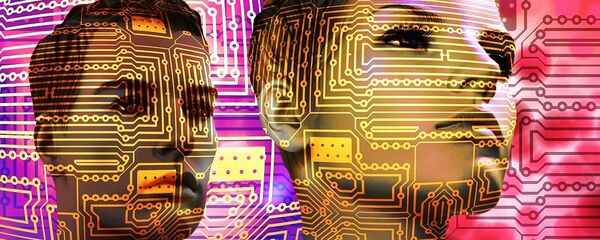An intellectual agent called Virtual Actor that has both narrative and emotional intellect will be developed at the NRNU MEPhI within the next year and a half, Alexei Samsonovich, professor of George Mason University, Krasnow Institute for Advanced Study and NRNU MEPhI Cybernetics Department, told RIA Novosti's Yulia Osipova.
MEPhI has received a grant to study biologically substantiated cognitive system models (2015-2017). Does this involve the development of artificial intelligence?
Prof. Alexei Samsonovich: That's right. Our principal goal is to formulate the basic principles that natural intelligence in the human brain is built upon. Biological solutions are in many respects superior to artificial solutions in terms of their adaptability, learning ability, resistance to unexpected interventions, and so on, and we would like to model these principles on the computer.
There are a lot of approaches and a lot of scientists are racking their brains over this. There is a bottom-up approach, when people attempt, step by step, to reproduce the structure of the brain, starting with neurons. I personally take a different line. It is essential to understand the fundamental principles that underlie our thinking and look for ways to convert them into specific models, even in neural networks.
I would describe this approach as both bottom-up and top-down at the same time. What is required is a combination of different approaches (functional, neural, symbolic and logical) — neither the highest, nor the lowest level approach, and there is a gap in between. We have theories describing human thinking on a high level — psychology, cognitive modeling, etc. There are models describing brain function on a lower, neuron, level. However, so far scientists have had little success dovetailing the two. Still, this is where a scientific breakthrough should be expected.
Since when has mankind been looking for systems similar to its own?
Prof. Alexei Samsonovich: The idea emerged since mankind emerged. Ancient philosophers always speculated about ways to understand and model a human being. However, the term "artificial intelligence" appeared in 1956 at the Dartmouth Conference where a human intellect model development program was formulated.
Scientists planned to make this breakthrough soon, replacing man with machine in many areas of intellectual activity. This did not happen. It proved hard going. What seemed difficult turned out to be easy, and vice versa. The problem has still not been solved. It's all talk and no action, and people begin to think that the idea of artificial intelligence has discredited itself, moving into science fiction. Nevertheless, the fact is that we really are coming closer to this point. Today, we are already on the verge…
Why does the computer need a human-thought equivalent in the first place?
Prof. Alexei Samsonovich: Artificial intelligence will make man's life easy, taking on a lot of functions. Let me give an example. In its time, the computer replaced the calculating machine, drawing board and musical instrument; the smartphone replaced the photo camera, voice recorder, computer and even pocket flashlight — all in one.
Now we should expect new software that will replace Photoshop, Word and all other applications, the only difference being that it will be able to understand exactly what you need. You will communicate with your computer or smartphone as you would with a person. That is, you will have mutual understanding with it not as with a tool but as with a partner and assistant. It will understand your emotions and goals, as well as the situation in the outside world. It is a kind of singularity, where all functionalities converge at one point, and this gives you a complete set of options.
How can a complicated biochemical process involving 100 billion neurons be reproduced artificially?
Prof. Alexei Samsonovich: This is the specific of our approach. We try to understand and reproduce the principles of information processing in the human brain, assuming that it is unnecessary to reproduce all neurons and ion channels to do so.
Let's take the hippocampus (the brain section responsible for memory). Its perception of space is based on a large population of neurons. If they are positioned on a certain plane according to certain rules, their aggregate activity will be focused on a single point with the coordinates X and Y. The question is: Do we have to reproduce millions of neurons, tens of thousands of connections between each of them and hundreds of thousands of millions of ion channels just to represent two numbers? There are more effective ways of doing this.
Needless to say, neural networks can solve certain problems with maximum efficiency. But do they have to be made biologically realistic? Is it necessary to make them identical to the human brain? I'm sure that existing computers, their parameters in terms of speed and memory volume, are already sufficient for creating humanoid intelligence. We simply do not know exactly how to do this yet. The problem is not related to hardware.
What about a flash genius? Creative urge? Insight? Will hardware ever be capable of this?
Prof. Alexei Samsonovich: As John von Neumann said, "If you tell me precisely what it is a machine cannot do, then I can always make a machine which will do just that." If you can define precisely what "insight" is, then a John von Neumann will come forward who will write an algorithm based on this definition and give the world an "insightful" machine.
Imagine that tomorrow a computer will appear that you'll communicate with by phone via terminal. You will not know exactly who is sitting at the other end — man or machine. Supposing, after talking to it, you will say that it is a genius, and then it turns out that it was a computer. What will you do about that?
By the way, our international youth school for Biologically Inspired Cognitive Architectures (BICA), which will take place at NRNU MEPhI on April 21-24, will be attended by Professor Antonio Chella of the University of Palermo, the maker of the dancing robot Robodanza, which has a brilliant sense of human movements.
What are your scientific ambitions for the next few years? What is your vision of the more distant future?
Prof. Alexei Samsonovich: I can't look 100 years ahead. By that time, possibly, a quantum computer will appear and life will exist in different dimensions — in the direct and figurative sense of the word.
Within the next year and a half we at the NRNU MEPhI plan to create an intellectual agent, Virtual Actor, which will have both an emotional and a narrative intellect. It will understand the context of what is going on, as well as the unfolding scenarios. Based on this, it will make plans and set targets. One of its abilities is to be an actor, a virtual robot playing the role of a particular person.
Are you close to creating it?
Prof. Alexei Samsonovich: Yes, we are, in theory and in understanding the principles of its creation, but it will take time to put this into reality. So far, we plan to create this agent in a simplified form — as a computer game. A virtual agent and a real person control the figures on a computer screen, interacting with each other, thus building social rapport based on emotionally charged actions. They can attack, welcome, give way, help move a stone, and so on. Any action has an emotional connotation, as a result of which certain relations develop, such as trust, subordination, leadership, etc. If a person in the virtual world is unable to tell man from machine, this goes to show that we have reached a human level, albeit in a limited sense.
Another area of our work is related to the registration of human brain activity to understand what a person thinks, what he perceives visually and what kind of emotions he feels. A lot has already been done alone these lines in the West. Large numbers of scientists, including our compatriots, are working on this. Even now, based on human brain activity, it is possible to determine whether a person thinks about a hammer or a screwdriver. This is not about reading thoughts in the form of a text, as Natalia Bekhtereva tried to do in her time. We are talking about identifying categories of objects, actions and relations that a person thinks about. "A doctor has saved a patient" — if a person thought so, then he should have some perception about a particular doctor, his patient and saving him. Such things are already being done in the world.
Do you think this is a blessing or a curse?
Prof. Alexei Samsonovich: Of course, reading human thoughts can be used for global control, where people will be unable to hide anything even deep in their subconscious. That would be terrible. However, the idea is to expand human consciousness. If a person can control a computer with his thoughts, then it will be difficult for us to say where "I" ends and "machine" begins. Meanwhile, the computer has unlimited capabilities, while the biological capabilities of the human brain are limited.
What if the machine surpasses human intellect and then turns against man?
Prof. Alexei Samsonovich: The most important scientific discoveries often get a bad name, falling into the wrong hands. Take molecular electronics. How much hope was pinned on the creation of computers using molecular-level computing elements? The result, however, was the creation of spying devices, for example, devices implanted into the body and then disappearing without a trace.
How can we think about machines turning against people if they are not independent in any way? The machine-like life form is becoming part of human civilization. Man programs a robot and it will soon be taught like a student to communicate with man on equal footing. However, in the next 100 years, I'm sure Robot will be unable to "overthrow" Man. This is not logically possible, even hypothetically.
Now, amid the development of biological and genetic weapons, artificial intelligence is the most harmless of upcoming discoveries. I believe it will be a major step forward, a big event for humankind.




